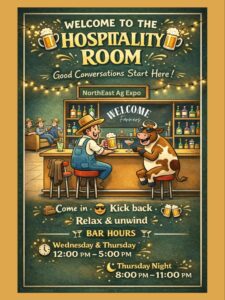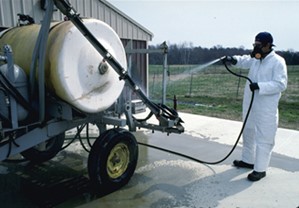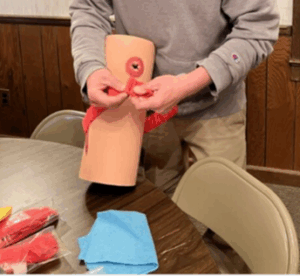The Rutgers Farm Health and Safety Working Group is conducting a survey to evaluate the priority needs of New Jersey farmers for training and resource development related to safety and health. As a New Jersey farmer, you are invited to complete this survey. Click here to access the survey and learn more. [Read more…]
On-Farm Food Safety Section
Keep up with the latest news on this dynamic topic that impacts growers on multiple levels. Developing a farm food safety plan is a good idea for all growers, and may be required as part of food safety audits if you sell to certain buyers.
View NJAES On-Farm Food Safety Essentials
NE Agriculture Expo and Rutgers Educational Sessions Start Tuesday 1/20/26 to Thursday 1/22/26 in Atlantic City
The NE Agriculture Expo and Rutgers Educational Sessions Start Tuesday 1/20/26 at Harrah’s in Atlantic City, 777 Harrahs Boulevard. The final day of educational sessions and trade show ends on Thursday at 5pm.
The weather may be cold, but no rain or no snow in the forecast, and warm times inside the conference center to network with others in the industry. An afternoon Hospitality Room will be available 12-5pm on Wednesday and Thursday to relax and unwind in the trade show area. Come for the social aspects, education and gain pesticide recertification credits. Check out the Rutgers Educational Program to see what topics you would like to learn about. go.rutgers.edu/2026rutgerseduprog
What’s Happening
January 20 (Tuesday)
- Pre–trade show workshops and sessions
January 21 (Wednesday)
- Full day of educational sessions for all commodity groups • Year of the Women Farmer Luncheon
- Packed trade show with vendor booths sold out
- Live charity auction with FREE food
January 22 (Thursday)
- More sessions
- Another day packed trade show with vendor booths sold out
- Special appearance by Temple Grandin book signing /meet and greet, then her special session (additional cost)
Registration Options On-Site at the Regitration Counter (hallway of conference center) or On-line https://vganj.com/convention-tickets“>https://vganj.com/convention-tickets
✔️ VGANJ Membership – $100
Includes 2 Expo passes
Additional passes just $25 each
✔️ One-Day Pass – $60

Access to sessions + trade show
Register On-Line to
- Save time at registration
- Walk in, grab your badge
- Enjoy FREE breakfast (8am-10am Wednesday and Thursday in Trade Show)
- Head straight to learning, growing, and catching up with friends
This event under one roof, packed with education and energy, and celebrating New Jersey agriculture at its best.
Plus, buy your tee shirt or hoodie at the registration desk to “Support New Jersey Farmers” and tout “No Farmers No Food” – new this year.
NEED PESTCIDE RECERTIFICATION CREDITS? REGISTER TODAY
4 CORE Credits – Pesticide Safety Workshop
A Tuesday, January 20, 2026 Workshop for Pesticide Applicators to gain CORE Credits towards their license will be held at the NE Agriculture Expo at Harrah’s in Atlantic City to start of this year’s event. This workshop will take place from 10:00AM to 12:00PM. Licensed applicators must accumulate 8 CORE Credits over a 5-year period to maintain their NJDEP Pesticide Applicators License. This workshop will offer 4 CORE Credits. Pre-registration is requested and can be found on the VGANJ website at https://vganj.com“>https://vganj.com. Registration cost is $25 per person and non-refundable. Registration for this workshop is separate from the convention registration and attendees must also register for the expo at https://vganj.com/convention-tickets. The topics include: Pesticide Safety – Personal Protection Equipment for the Pesticide Applicator; Update on US EPA Worker Protection Standards; Storage, Tank Mixing, Tank Cleaning, and Disposal; Pesticide Record Keeping and Notification. For more information contact Bill Bamka (bamka@njaes.rutgers.edu) or Michelle Infante-Casella (minfante@njaes.rutgers.edu).
For the full program (January 20-22nd) of Rutgers Educational Workshops and Sessions that offer more credits and diverse topics, see https://go.rutgers.edu/2026rutgerseduprog

2 “Stop the Bleed” Trainings North and South Jersey
2 STOP THE BLEED TRAININGS SCHEDULED
FOR FARMERS AND THE AGRICULTURAL COMMUNITY
REGISTRATION REQUIRED – NO COST
SATURDAY, JANUARY 10TH IN SUSSEX COUNTY STARTING AT 10:00AM
&
MONDAY, FEBRUARY 2ND IN GLOUCESTER COUNTY STARTING AT 9:00AM

FOR SUSSEX COUNTY ON SATURDAY, JANUARY 10TH AT 10:00AM – CALL TO REGISTER: 973-948-3040
LOCATION: RUTGERS COOPERATIVE EXTENSION OF SUSSEX COUNTY, 130 MORRIS TNPK, NEWTON, NJ
-OR-
FOR GLOUCESTER COUNTY ON FEBRUARY 2ND AT 9:00AM – REGISTER USING THIS LINK OR QR CODE:
https://go.rutgers.edu/stopthebleed

LOCATION: GLOUCESTER COUNTY OFFICE OF GOVERNMENT SERVICES
1200 N. DELSEA DR., CLAYTON, NJ
Rutgers Cooperative Extension’ Farm Health and Safety Team has 2 scheduled events for “Stop the Bleed” training for the farming community.
Don’t miss this opportunity to learn the life-saving skills of pressure application, wound packing, and use of tourniquets. The first 25 registrants at each location, will also receive a complementary bleeding control kit.
Space is limited, register today.
If you have questions contact Rutgers Cooperative Extension of Sussex County (973-948-3040) or Gloucester County (856-224-8040 ext. 1)
Rutgers Farm Health and Safety Team:
Agricultural Agents: Kate Brown, Michelle Infante-Casella, William Bamka, and Stephen Komar
Wednesday Luncheon at the NE Ag Expo 1/21/26 – Sign Up Today
All are welcome to the 2026 Celebration of the International Year of the Female Farmer on Wednesday, January 21st at the Northeast Ag Expo at Harrah’s in Atlantic City. Your $25 ticket includes access to the luncheon and keynote speakers – Carrie Edsall from New York and NJ Dairy Princess – Dakota Meys. Lunch is a full hot food buffet and dessert. This event will be inspirational and is also a very affordable way to have lunch while at the expo. Spend this time to network with fellow farmers and support women in agriculture. To register for the Expo and the Wednesday Luncheon go to https://vganj.com/convention-tickets

Food Safety Modernization Act: Produce Safety Rule Training
When: Tuesday, January 20, 2026, from 10:00-5:00 EST.
Where: Northeast Agricultural Expo (New Jersey Vegetable Growers Convention) at Harrah’s Waterfront, 777 Harrah’s Blvd., Atlantic City, NJ.
To sign up: https://onfarmfoodsafety.rutgers.edu/fsmaac/
Online ticket Sales end on Tuesday, January 13, 2026. Registration after January 13, or in-person registration at the conference, must be paid by check.
Who Should Attend
- Fruit Growers
- Vegetable Growers
- Growers who have farms that fall under the PSR
- Growers who have farms that don’t fall under the rule but will in the future
Benefits of Attending the Workshop
Individuals who participate in this course will gain a basic understanding of:
- Requirements in the FSMA Produce Safety Rule and how to meet them
- Fulfills the requirement for at least one supervisor from a farm to complete food safety training at least equivalent to the standardized curriculum recognized by the FDA
- Microorganisms relevant to produce safety
- Where microorganisms may be found on the farm
- How to identify microbial risks, practices that reduce risks and how to begin implementing produce safety practices on the farm
- Parts of a farm food safety plan and how to begin writing one
- Cleaning and Sanitizing
What to Expect at the Produce Safety Alliance Grower Training:
- Introduction to Produce Safety
- Worker Health, Hygiene and Training
- Soil Amendments
- Wildlife, Domesticated Animals and Land Use
- Agricultural Water (Part I: Production Water; Part II: Postharvest Water)
- Postharvest Handling and Sanitation
- How to Develop a Farm Food Safety Plan
After attending the entire course, participants will be eligible to receive a certificate from the Association of Food and Drug Officials (AFDO) that verifies they have completed the training course. To receive an AFDO certificate, a participant must be present for the entire training and submit the appropriate survey to their trainer at the end of the course.
Does your farm fall under the FSMA PSR? Find out at the link below.
https://rutgers.ca1.qualtrics.com/jfe/form/SV_4IagP1mbPyrp42N
